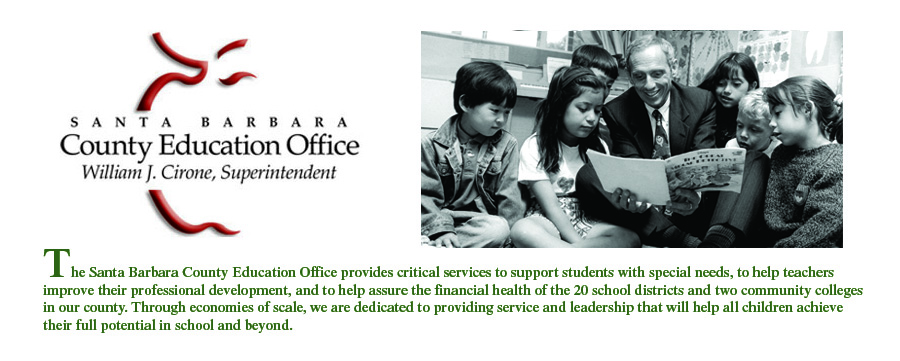By Bill Cirone, Santa Barbara County Superintendent of Schools
Once again, as we celebrate this season of Thanksgiving, we want to give heartfelt thanks on behalf of our public schools to all the business and community members who support our local classrooms, families, and children in so many ways.
It is so very encouraging and inspiring that even in challenging times, we can join hands in partnership and help bolster one of our community’s most valuable assets, our schools. Our partnerships in this area are wide and deep, including community members, business leaders, and educators at every level.
Members of the community help in ways that are impossible to overstate. Parents volunteer in local classrooms. PTA members play invaluable roles at every school. Relatives and friends support fundraisers, and neighbors pitch in at every turn, attending sports events, concerts, and plays. That support means a lot to the young people who witness it every day, and see first-hand that the adults around them value what is happening in their classrooms.
The circle of supporters extends well beyond friends and family. The local business community also provides strong support of our schools in ways both large and small. Businesses have contributed hundreds of thousands of dollars to support the Teachers Network, a program that recognizes outstanding teachers and spreads successful classroom ideas.
Thanks to strong business and community sponsorship and support, two annual events, A Salute to Teachers and the Education Celebration, celebrate and honor outstanding teachers and the high quality education they bring to the 67,000 public school children in 20 school districts throughout our county.
Partners in Education is yet another fine example of the synergy created by our local business, philanthropy, and education communities. The vision and support of local leaders have made possible Partners’ nationally acclaimed Computers for Families program and the North County Computer
Connections program. Since its inception, Computers for Families has provided more than 11,500 computers to needy children and families in its continuing quest to ultimately eliminate the digital divide.
In addition to being technology advocates, local community and business members throughout Santa Barbara County also champion arts and sports programs, serve as mentors, take part in Career Day programs and Principal for a Day, along with myriad other activities that support students and teachers.
Clearly our business and community leaders understand that students in today’s classrooms will be tomorrow’s workforce and leaders. The level and quality of their support and the range of resources are
extremely impressive and greatly appreciated.
Educators at every level also deserve our thanks as integral parts of these important partnerships. Chief among those we must recognize this Thanksgiving season stand the unsung heroes and heroines in classrooms countywide, teachers who make a difference every day in the lives of the children and families they serve. Teachers embody our society’s belief that universal public education is key to meeting the challenges of a changing world. They strive to make every classroom an exciting environment where productive and useful learning can take place, and each student is encouraged to grow and develop according to his or her talents and abilities.
Our teachers reach out to foster the well being of every student, regardless of ability, motivation, background, race, or beliefs. Teachers help inspire students to find new directions in life and reach for high levels of achievement. We are enormously thankful for all they do, and for the support they receive from parents, business leaders, and members of the community, which is so vital to their ability to succeed.
“Everything America is, or ever hopes to be,” commentator Frosty Troy once said, “depends upon what happens in public school classrooms, where millions of boys and girls will get their chance in life.” His message remains indisputable.
On behalf of the entire educational system in our county, I offer thanks to members of our community for helping the students of Santa Barbara County succeed. Thank you for caring and for all you do. Your help is invaluable. Every day you are making an incredible, lasting difference in the lives of our young people. This is a fitting season to make time to express our gratitude.
